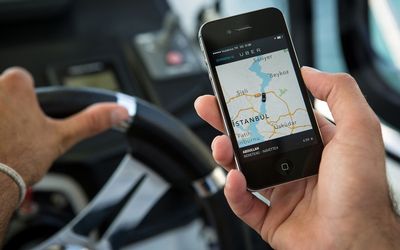APP-based taxi service Uber has been given a lifeline that will allow it to navigate a regulatory speedbump without hindering its operations in SA.
Uber welcomed a new transport bill that will allow the use of a smartphone in lieu of a meter.
The entrance of Uber in SA presented authorities with a regulatory headache as the service did not fall into any of the categories of the National Land Transport Act.
But now the Cabinet has approved the National Land Transport Amendment Bill, which considers Uber operators to be metered-taxi operators. Uber had pushed for an e-hailing subcategory to be included in the bill, but the government rejected this.
However, the bill does allow the use of a smartphone in lieu of a meter. Uber — which is headquartered in San Francisco and operates in cities around the world — uses a smartphone application to receive ride requests and sends these trip requests to its network of drivers.
"Uber respects the key role the national government plays in ensuring that South Africans have access to safe, affordable and efficient transportation options and we welcome this positive outcome," Uber spokeswoman Samantha Allenberg said on Monday.
"For over two years, we have been actively working with regulators across SA to adopt appropriate regulations to accommodate new technologies that can help solve many of the current problems with urban transportation — safety, accessibility and lost productivity at work," she said.
However, Ms Allenberg said, Uber would not be commenting on the details of the bill.
"Our team is engaging with policy makers on the details … for now we are not commenting on the details," she said.
A source involved in the discussions about the bill said if it came into force, Uber would have an unfair advantage, although it would face a regulatory burden.
Uber was now banking on the City of Cape Town introducing a by-law that would create a legal framework for e-hailing.
"If that by-law comes into force, then Uber will not have much difficulty operating in Cape Town … they will use that by-law to circumvent the national law … that is what they are now banking on," said the source. Debate about the regulation of Uber took centre stage last year after Cape Town traffic officials impounded more than 200 Uber cars because drivers did not hold metered taxi permits.
Metered taxi drivers protested in the Western Cape and Gauteng, claiming Uber drivers had an unfair competitive advantage because of a lack of regulation around the service. Uber has been in talks with metered-taxi associations to find a way to partner with them.
The potentially cheaper and faster service has faced opposition from taxi operators around the world since its launch in 2009.

Uber's smartphone app. Photographer: BLOOMBERG/KEREM UZEL
APP-based taxi service Uber has been given a lifeline that will allow it to navigate a regulatory speedbump without hindering its operations in SA.
Uber welcomed a new transport bill that will allow the use of a smartphone in lieu of a meter.
The entrance of Uber in SA presented authorities with a regulatory headache as the service did not fall into any of the categories of the National Land Transport Act.
But now the Cabinet has approved the National Land Transport Amendment Bill, which considers Uber operators to be metered-taxi operators. Uber had pushed for an e-hailing subcategory to be included in the bill, but the government rejected this.
However, the bill does allow the use of a smartphone in lieu of a meter. Uber — which is headquartered in San Francisco and operates in cities around the world — uses a smartphone application to receive ride requests and sends these trip requests to its network of drivers.
"Uber respects the key role the national government plays in ensuring that South Africans have access to safe, affordable and efficient transportation options and we welcome this positive outcome," Uber spokeswoman Samantha Allenberg said on Monday.
"For over two years, we have been actively working with regulators across SA to adopt appropriate regulations to accommodate new technologies that can help solve many of the current problems with urban transportation — safety, accessibility and lost productivity at work," she said.
However, Ms Allenberg said, Uber would not be commenting on the details of the bill.
"Our team is engaging with policy makers on the details … for now we are not commenting on the details," she said.
A source involved in the discussions about the bill said if it came into force, Uber would have an unfair advantage, although it would face a regulatory burden.
Uber was now banking on the City of Cape Town introducing a by-law that would create a legal framework for e-hailing.
"If that by-law comes into force, then Uber will not have much difficulty operating in Cape Town … they will use that by-law to circumvent the national law … that is what they are now banking on," said the source. Debate about the regulation of Uber took centre stage last year after Cape Town traffic officials impounded more than 200 Uber cars because drivers did not hold metered taxi permits.
Metered taxi drivers protested in the Western Cape and Gauteng, claiming Uber drivers had an unfair competitive advantage because of a lack of regulation around the service. Uber has been in talks with metered-taxi associations to find a way to partner with them.
The potentially cheaper and faster service has faced opposition from taxi operators around the world since its launch in 2009.





















Change: -0.47%
Change: -0.57%
Change: -1.76%
Change: -0.34%
Change: 0.02%
Data supplied by Profile Data
Change: -1.49%
Change: 0.24%
Change: -0.47%
Change: 0.00%
Change: 0.06%
Data supplied by Profile Data
Change: -0.15%
Change: 1.44%
Change: 1.03%
Change: 0.51%
Change: 1.53%
Data supplied by Profile Data
Change: 0.25%
Change: -0.42%
Change: 0.07%
Change: -1.05%
Change: -0.37%
Data supplied by Profile Data